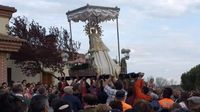As Easter Sunday comes to a close, the observance of Lunes de Pascua (Easter Monday) on April 21, 2025, marks a significant moment in Spain's cultural and religious calendar. However, unlike the nationwide holidays of Jueves Santo (Holy Thursday) and Viernes Santo (Good Friday), Lunes de Pascua is only recognized as a holiday in certain autonomous communities, creating a patchwork of observances across the country.
In 2025, only five autonomous communities will celebrate Lunes de Pascua as a non-working day: Cataluña, Comunidad Valenciana, Navarra, País Vasco, and La Rioja. This is a reduction from the previous year when six communities recognized the holiday, as Baleares has opted to cancel its observance this year. The decision reflects ongoing adjustments in regional holiday calendars, which are influenced by local customs and preferences.
The cancellation in Baleares comes as part of an effort to reorganize the regional holiday schedule, allowing for a more balanced distribution of non-working days throughout the year. In previous years, the region had celebrated Lunes de Pascua, but this year, the focus has shifted to other significant dates.
In Spain, the determination of public holidays involves a collaborative process between the national government, regional governments, and local municipalities. Each year, a total of 14 public holidays is established per municipality, with eight being national holidays that apply across the country. These include widely recognized dates such as January 1, August 15, and December 25. The remaining holidays are determined by each autonomous community based on cultural, historical, or religious significance, along with two additional days chosen by local councils.
The observance of Lunes de Pascua is steeped in religious significance, marking the end of Semana Santa (Holy Week) and the beginning of the Tiempo Pascual (Easter Time) in the Christian calendar. Traditionally known as Lunes del Ángel, this day commemorates the resurrection of Christ and is celebrated with various cultural activities across the regions that recognize it.
In communities like Cataluña and Comunidad Valenciana, families come together to enjoy traditional Easter meals, including the popular monas de Pascua, a cake decorated with colorful eggs. The day is often marked by festive activities, including egg hunts and communal gatherings, emphasizing the cultural importance of Easter celebrations.
In contrast, regions such as Madrid, Castilla y León, Andalucía, Galicia, Aragón, Extremadura, Castilla-La Mancha, Canarias, Murcia, Ceuta, and Melilla will observe April 21 as a regular working day. This divergence in holiday observance can lead to confusion, especially for those traveling within the country, as many businesses and public services will remain operational in these areas.
Despite the differences in holiday recognition, the significance of Lunes de Pascua remains evident. It's a day that traditionally allows families to reconnect after the Easter festivities, providing a moment of respite before returning to the routine of daily life. The historical roots of this holiday can be traced back to the Carolingian era, when it became customary to grant workers a day of rest following Easter Sunday, facilitating their return home after religious observances.
The variability in holiday observance across Spain highlights the rich tapestry of regional cultures and traditions that define the nation. Each autonomous community maintains its unique identity, reflected in the way it chooses to celebrate or forgo certain holidays. This flexibility allows for a more personalized approach to public holidays, catering to the preferences and historical contexts of each region.
As Spain prepares for Lunes de Pascua, it’s essential for residents and travelers alike to check local holiday calendars to avoid any disruptions. With many communities celebrating this day as a holiday, it is an opportunity for families to come together and partake in the joys of Easter festivities, while others will be returning to work and school, continuing the rhythm of everyday life.
Looking ahead, the next public holiday in Aragón will be on April 23, 2025, when the region celebrates San Jorge (Día de Aragón). This day will be a significant occasion for many, as it honors the patron saint of Aragón and includes various cultural and social activities. Following that, the entire country will observe May 1 as Día Nacional de los Trabajadores (National Workers' Day), a day dedicated to recognizing the contributions of the labor movement.
In summary, Lunes de Pascua serves as a reminder of the diverse cultural practices that exist within Spain, showcasing how different regions honor their traditions while navigating the complexities of holiday observance. Whether celebrated with joy and festivity or marked as a regular workday, the significance of this day resonates throughout the nation, reflecting the enduring spirit of Easter.










